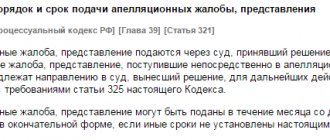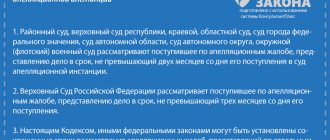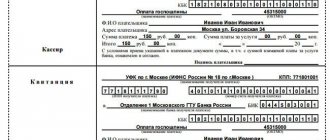1. The court decision consists of introductory, descriptive, motivational and operative parts.
2. The introductory part of the court decision must indicate the date and place of the court decision, the name of the court that made the decision, the composition of the court, the secretary of the court session, the parties, other persons participating in the case, their representatives, the subject of the dispute or the stated claim.
3. The descriptive part of the court decision must contain an indication of the plaintiff’s claim, the defendant’s objections and explanations of other persons participating in the case.
4. The reasons for the court decision must indicate the circumstances of the case established by the court; evidence on which the court's conclusions about these circumstances are based; reasons why the court rejects certain evidence; laws that guided the court. If the defendant recognizes the claim, the reasoning part of the court decision can only indicate the recognition of the claim and its acceptance by the court. In the case of refusal of the claim due to the recognition of unjustified reasons for missing the statute of limitations or the deadline for filing a lawsuit in the court, the reasons Parts of the court decision indicate only the court's establishment of these circumstances.
5. The operative part of the court decision must contain the court’s conclusions on the satisfaction of the claim or on the refusal to satisfy the claim in whole or in part, an indication of the distribution of legal costs, the deadline and procedure for appealing the court decision. The operative part of the court decision made by the magistrate must also contain an indication of the deadline and procedure for filing an application for drawing up a reasoned court decision.
What is a court decision: concept
A decision is a court document containing the results of consideration of the dispute on the merits. In civil proceedings, it is accepted within the framework of claim, absentee, simplified or special proceedings. In writ proceedings, an order is issued.
The decision is made taking into account several legislative principles:
- Legality. It is believed that the verdict is made taking into account the correct application of procedural rules and regulations.
- Feasibility.
Mandatory execution after entry into force, unless an appeal is filed. The exception is cases when the document becomes valid instantly. - Legal force. The requirements are fulfilled immediately after the expiration of the appeal period.
- Prejudice. The verdict that has entered into force cannot be challenged in the framework of legal proceedings on other disputes.
- Commitment. The document is mandatory for all state and municipal authorities, commercial organizations. If the verdict is not implemented, a forced execution procedure is carried out.
- Exceptionality. The parties participating in the case do not have the right to appeal to the court with the same issue again.
- Irrefutable. A document that has entered into force cannot be challenged, except for newly discovered circumstances.
The purpose of all decisions is to achieve justice and a fair settlement of disputes between the plaintiff and the defendant, or several participants in the proceedings. It is made taking into account the above principles.
How is a court decision made?
According to Art. 199 of the Code of Civil Procedure of the Russian Federation, the verdict is adopted in the deliberation room immediately after consideration on the merits, during which the attendance of the participants in the process is checked, witnesses and experts are invited, evidence is examined, and debates are held.
The operative part is announced immediately, signed by all judges and attached to the materials. The motivated statement is drawn up within 5 days from the date of acceptance.
Note! In a case being considered in a magistrate's court, the judge has the right not to formalize the reasoned part. However, he must do it upon receipt of an application from the participants in the process within three days, if they were present at the last meeting. If they were not there, 15 days are allotted for registration.
Timeframe for making a decision
Decisions are made immediately after consideration of the dispute on the merits in a deliberation room by one or more judges.
The maximum duration of proceedings depends on the specific type of proceedings:
| Type of production | Duration of proceedings |
| Claim proceedings |
|
| Simplified production | From 15 to 30 days |
| Special production | General and reduced deadlines apply:
|
Note! The actual time spent by the plaintiffs may be longer if the proceedings are suspended or due to other circumstances. The period of suspension is regulated by Art. 217 Code of Civil Procedure of the Russian Federation.
Time limits for the decision to enter into legal force
Decisions come into force at the end of the appeal period - 1 month from the date of adoption.
Shorter deadlines are established for certain categories:
- simplified proceedings: 15 days from the date of acceptance, when submitting an application for preparation of the motivation part - from the date of acceptance in the final form;
- special: determined individually depending on the dispute, most often takes effect immediately after the decision;
- claim and absentee – 1 month.
After receiving the document, pay attention to the operative part - it indicates the deadline for appeal.
When can I withdraw the decision?
The plaintiff and defendant can receive copies against receipts within 5 days after acceptance. If the document is made in electronic form, with their permission, the information is published on the official website of the court - you can also view the data there. FULL NAME. and other personal information is not posted - only the essence of the dispute and the result of the proceedings are described.
Paper documents are sent to participants no later than 5 days after publication using Russian Post by registered mail with acknowledgment of receipt.
Legal advice: if you want to pick up the document faster, contact the office or the assistant judge after 5 days. You will be given it against receipt on the day of application.
How can I get a reasoned decision?
Let us note once again that the operative part of the resolution contains the final decision made by the judicial institution. As a rule, it describes which side won the dispute, how much the losing participant must pay, the procedure for this payment. The reasoned part contains information about what forced the judge to make such a decision, what materials were provided for this, etc. .
If a citizen has all this information in his hands, he will definitely see the full picture of what is happening. Knowing the motivated part, you can know what the judge was guided by when making the final verdict. In addition, the motivated part will be needed for drawing up an appeal, or for further proceedings in another court.
To obtain such a decision, it is necessary to draw up an appropriate application. Any participant in the process can formalize it.
Note! You only have three days to get a decision! To avoid missing deadlines, we advise you to submit your application immediately after the completion of the trial.
If a participant in the process was absent from the meeting for various reasons, he may be given fifteen days to receive a reasoned part.
Structure and content of a court decision in a civil case
The document may contain all parts or only some of them:
| Part | Description |
| Introductory |
|
| Descriptive |
|
| Motivational (argumentative) |
|
| Resolution (does not contain arguments) |
|
The specific content of the court decision depends on the type of proceedings within which the dispute was considered: simplified, absentee, special, claim (standard). In all cases, different requirements are imposed on the content. Let's look at the details in more detail.
Simplified production
Disputes regarding the recovery of money and property worth up to 100,000 rubles are considered through simplified proceedings. No hearings are scheduled, the verdict is rendered individually.
What are the features here:
- the operative part is issued and sent to the parties no later than the day following the date of adoption;
- the reasoned part is drawn up within 10 days only if the plaintiff or defendant has filed a corresponding application, or an appeal has been initiated through a higher authority;
- Instead of the standard appeal period, a shortened one is applied. The complaint is filed within 15 days from the date of issue, after which it becomes legally binding.
Note! If a participant in the process submits an application for the execution of a reasoned part, the countdown of the appeal period changes: instead of the date of first acceptance, it must be counted from the date of execution in its final form.
Contents of the court decision: What data is reflected in the document adopted in a simplified manner:
- introductory part: name of the court, details of the participants, subject of the dispute;
- operative: conclusions on the claims, the obligations of the defendant, the possibility of drawing up a reasoned section, the appeal procedure.
Sample summary court decision in a civil case:
Absentee proceedings
A decision in absentia is made with an appropriate note when considered in general proceedings, if the defendant, duly notified of the meeting, did not appear at it without good reason.
A verdict rendered in absentia may be contested by defendants within 7 days from the date they received copies if valid reasons for absence from the hearing and the impossibility of advance notification of the absence are proven (Article 237 of the Code of Civil Procedure of the Russian Federation). The effective period is one month. To cancel, a corresponding application is submitted.
Contents of the application to cancel the default decision: The application is submitted to the office, drawn up in accordance with Art. 238 Code of Civil Procedure of the Russian Federation and contains the following data:
- name of the judicial authority;
- FULL NAME. the applicant;
- description of a valid reason: illness, business trip, etc.;
- evidence of valid reasons for absence;
- request for cancellation.
A signature is placed below. The court will need several copies - the number must correspond to the number of participants in the proceedings.
Sample application for cancellation of a default judgment in a civil case:
Contents of a court decision in absentia: The document is drawn up in accordance with the provisions of Art. 198, 199 Code of Civil Procedure of the Russian Federation.
All parts and complete data are indicated:
- date, number, place of consideration;
- essence of the dispute;
- Full name, addresses of the parties;
- information about witnesses, representatives of government agencies, and other participants;
- a detailed description of the circumstances;
- submitted evidence, petitions;
- factually established circumstances;
- conclusions about claims (full, partial satisfaction, refusal);
- deadlines, appeal procedure.
Sample of a court decision in absentia in a civil case:
Special production
Cases concerning the establishment of facts of legal significance, as well as adoption, recognition of incapacity, recognition of a citizen as missing, registration of ownership of ownerless things, making adjustments to the registry office records (Article 262 of the Code of Civil Procedure of the Russian Federation) are considered in a special manner. Contents of a court decision in a civil case in special proceedings: Judicial decisions made based on the results of consideration of issues in special proceedings consist of four parts: introductory, descriptive, motivational, operative.
What are the features of document execution in individual cases:
| Case | Description |
| Adoption |
|
| Declaring a person missing or dead |
|
| Incapacity |
|
Claim proceedings
Claim proceedings are relevant when there are disputes between the parties about rights and the collection of compensation or penalties is required. The largest number of cases are considered in this order. Contents of the court decision in the claim proceedings: The decision is drawn up in accordance with Art. 198 Code of Civil Procedure of the Russian Federation, the following is indicated:
- introductory part: name of the court, subject of the dispute, data of the plaintiff and defendant, information about other participants;
- the descriptive contains the defendant’s claims, objections and petitions;
- the motivation includes established circumstances, conclusions, references to regulatory legal acts;
- if the defendant admits the claim, this is reflected in the reasons. No other data is provided;
- the operative part contains conclusions about the satisfaction or refusal of the claim and reimbursement of costs.
Note! Justices of the peace issue reasons only at the request of citizens. In the resolution they indicate the procedure and deadlines for filing such an application.
Sample court decision in claim proceedings:
Prosecutor in civil proceedings - forms and purposes of participation
Preliminary court hearing in civil proceedings
Consideration of an application for drawing up a reasoned decision
The magistrate considers the application for restoration of the term on his own, that is, without holding a court hearing. The magistrate draws up a reasoned decision within 5 days from the date of receipt of the application. If the magistrate refuses to draw up a reasoned decision, he issues a separate ruling, which can be appealed by filing a private complaint against the magistrate.
Refusal to draw up a reasoned decision can be due to only two objective reasons. This is a missed deadline or an application being submitted by an unauthorized person.
There is no need to draw up a separate statement if you file an appeal against a court decision. Then the magistrate is obliged to draw up a reasoned decision without receiving an application from a participant in the case.
Where can I view the court decision?
You can view publicly available information remotely. They are posted via the Internet on the basis of Art. 15 Federal Law dated December 22, 2008 No. 262-FZ.
You can get information from several resources:
- State Automated System of the Russian Federation “Justice”;
- Court decisions. RF;
- Federal Arbitration Courts. RF.
The data is also posted on the websites of the courts in which specific cases were considered. The placement period is no later than 1 month from the date of acceptance in final form.
State Automated System of the Russian Federation "Justice"
Obtaining information on the site is available through the “Search for judicial acts” menu.
It is enough to enter full or partial information about the document:
- dates of receipt, issue, entry into force;
- level, name of the court;
- Subject of the Russian Federation;
- production number, full name judges;
- article, authority;
- result.
Here you can select cases with or without the text of a judicial act.
Court decisions. RF
The site offers a simple or advanced search by full name. participant, the text of the document, the subject of the Russian Federation, the type of proceedings given by the judge, the period for consideration.
Federal Arbitration Courts. RF
Through the “Card Index of Arbitration Cases” documents are available for search using the following parameters:
- Full name, name, TIN of the participant, OGRN;
- judge's surname;
- name of the court;
- number, date of registration of the application.
The site is relevant for individual entrepreneurs and legal entities, as well as ordinary citizens who have resolved economic disputes through arbitration courts.
Website of the court where the case was heard
Available information can be viewed on the website of the court in which the dispute was heard. It is enough to know your full name. participants, name of the body, start and end dates of the proceedings.
In some cases, the search section asks for additional information.
What to do after receiving a court decision?
Having received a copy of the document, the plaintiff must write an application for the issuance of a writ of execution if the dispute was about the collection of compensation, penalties, alimony, and other monetary obligations.
The sheet is issued no later than the day following the date of acquisition of legal force. In some cases, it is issued immediately. Subsequently, the sheet is presented for execution to the FSSP or to the employer at the place of employment of the defendant, who owes money.
In some cases, a copy is sufficient for presentation to government agencies:
| Subject of dispute | Where is it provided? |
| Rosreestr, MFC |
| Marriage registry |
| Recognition of complete incapacity or limited legal capacity | Child protection |
| Inheritance cases | Notary, Rosreestr |
| Loan disputes | Financial institutions |
| Insurance disputes | Insurance companies |
How to appeal a court decision in a civil case: step-by-step instructions
Before the decision comes into force, an appeal is filed by an interested party who is not satisfied with the verdict. You should contact a higher authority, but through the court that issued the verdict. Subsequently, the documents are transferred to a higher authority.
If the decision has gained force or the appeal ruling is being appealed, a cassation appeal is filed. Let's look at who has the right to appeal and how to do it.
Who has the right to appeal to a higher court?
Appeal to a higher authority is available to the following persons:
- defendant or plaintiff;
- the prosecutor who took part in the dispute;
- to a third party whose opinion was sought during the proceedings;
- another person if the verdict affects his interests.
Legal representatives (lawyers) acting under a power of attorney also have the right to file complaints.
Appeal against a court decision
Complaints about verdicts that have not entered into force are considered by higher courts. For example, if the verdict is rendered by the magistrate court, the appeal is transferred to the district court. The highest point is the Supreme Court of the Russian Federation: its decisions come into force immediately after adoption and are not subject to challenge.
Having received the complaint, the appellate court sets a date for a hearing, during which the presiding officer speaks and the opinions of the parties are heard. Based on the results, a decision is made to leave it unchanged, cancel the previous verdict and send it for a second review, and terminate the proceedings.
Contents of the appeal against a court decision in a civil case:
The complaint to the appellate authority must contain complete data:
- name and address of the court;
- FULL NAME. applicant, telephone number;
- details of the case;
- date of the verdict;
- grounds for challenge;
- request for cancellation, adoption of a new decision.
The reasons include procedural violations committed during the proceedings, as well as non-compliance with legislative norms that violate the applicant’s rights.
Sample appeal against a court decision in a civil case:
Documents attached to the complaint: To appeal to the appellate authority, a complaint, a receipt for payment of the state fee, and a power of attorney, if a lawyer is acting on behalf of the applicant, are sufficient. The decision is given by the court that made it. The amount of the state duty is 50% of the payment paid upon the initial application to a lower authority.
Important! The complainant must send copies of the complaint to other participants. Sweat receipts are provided along with other documents.
Cassation appeal
Citizens have the right to appeal to cassation authorities within six months after the document enters into force. If the appeal ruling is contested, the period is counted from the date of its issuance.
Unlike an appeal, a cassation is filed with the court, which will consider it. Based on the results of the proceedings, the decision is left unchanged, sent for reconsideration, or fully or partially canceled the disputed document.
If the applicant is not satisfied with the results of the consideration of the complaint, he has the right to challenge it in a supervisory procedure. Contents of the cassation appeal:
The complaint form must comply with Art. 378 Code of Civil Procedure of the Russian Federation and contain the following information:
- name of the court;
- FULL NAME. the applicant;
- information about other participants;
- information about the lower courts that considered the dispute;
- grounds for challenge;
- request.
The document is signed by the applicant or his lawyer.
Sample cassation appeal:
Documents: Along with the complaint, a receipt for the transfer of state fees, a power of attorney for the representative, and a copy of the contested decision or ruling are provided.
Lawyer's answers to questions about a court decision in a civil case
How is a court decision drawn up if there are several plaintiffs?
The full details of the plaintiffs are indicated, shares in the property are distributed. If there are several defendants, the obligations to the plaintiff are distributed taking into account the circumstances.
Can they advise the court on appealing the decision?
No, the duties of court staff do not include consultations with the public. It is better to contact a lawyer or lawyer.
I was not at the hearing, the verdict was adopted in absentia. Can I challenge it? I received a copy 2 days ago.
Yes, based on Art. 237 of the Code of Civil Procedure of the Russian Federation, you have the right to file an application to cancel the default decision by presenting evidence of valid reasons for missing a meeting.
Do I need to go to court for a copy of the adoption verdict?
Yes. Despite the fact that it is sent automatically within three days after entry into force, a copy is provided by the applicant to the registry office along with other documents on the basis of Art. 41 Federal Law dated November 15, 1997 No. 143-FZ.
Lost the solution. How to restore it?
Contact the court with an application for a duplicate document and a passport.
Submission deadlines
As noted earlier, citizens are given three days to receive the document. If the deadline is missed, the judge has the authority to refuse to receive the motivated part. However, if the reasons for skipping are valid, the judge may meet halfway and serve the citizen with the requested document. To do this, you must provide evidence indicating an excused missed deadline.
Note! The Magistrate's Court is not obliged to formulate a reasoned part.
In other words, if the applicant submits a request for this document, it will be served on him. In another situation, the court may not do this.






